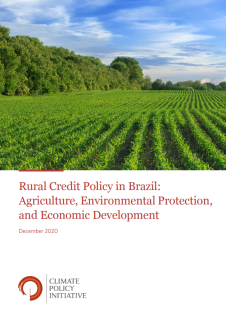
This report provides an in-depth analysis of Brazilian rural credit policy and discusses challenges and recent progress in public policy, including:
- The relationship among agricultural production, deforestation, and the need for effective finance.
- The structure of the rural credit system, looking into the fragmentation of financing rules and the credit distribution channels.
- The impact of rural credit on the real economy, land use, and deforestation.
- Brazil’s experience with credit and sustainability, including the ABC Plan and the alignment of credit with environmental protection.
- The important steps the Brazilian banking system is taking towards a better alignment between finance and sustainable practices.
The Brazilian government has the opportunity to leverage current policies and ensure they become more efficient and meet relevant objectives. Improved access to rural credit enables farmers, especially small ones, to increase agricultural productivity, relieving the pressures driving deforestation. The current tight fiscal regime and declining interest rates imply that subsidies tend to decrease at the aggregate level. Therefore, it is important to target resources for maximizing their impact on Brazilian agriculture sector and meet socially desirable objectives.
